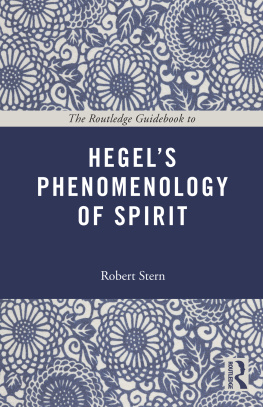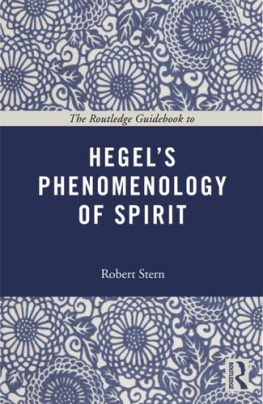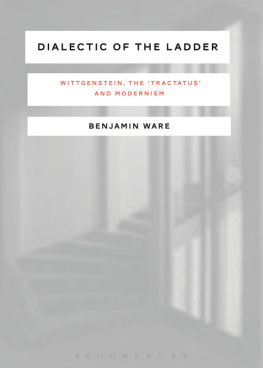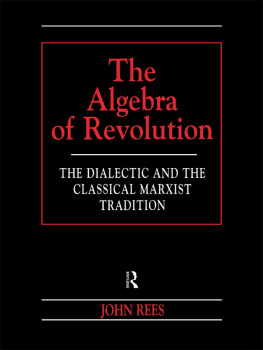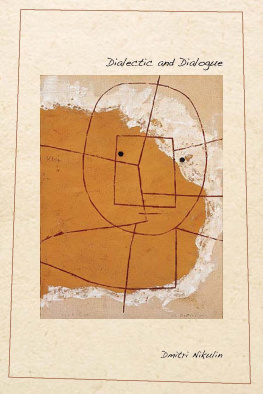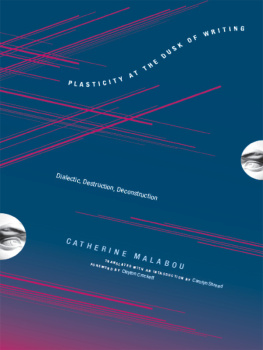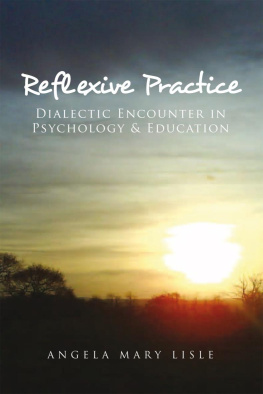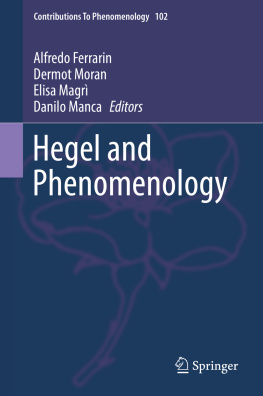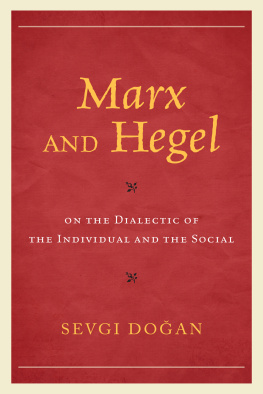Routledge Guides to the Great Books
The Routledge Guidebook to Hegels Phenomenology of Spirit
The Phenomenology of Spirit is Hegels most influential and important work, and unlocking this text is essential to understanding Hegels philosophical system. The Routledge Guidebook to Hegels Phenomenology of Spirit explores the major themes in Hegels classic work and aids the reader in understanding this key text, examining:
- The context of Hegels thought and the background to his writing
- Each section of the text in relation to its goals, meaning and significance
- The reception the book has received since its publication
- The relevance of Hegels ideas to modern philosophy.
With an introductory overview of the text, end-of-chapter summaries and further reading included throughout, this guidebook is essential reading for anyone wishing to get to grips with Hegels contribution to Western philosophy.
Robert Stern is Professor of Philosophy at the University of Sheffield, UK. He is the author of Hegel, Kant and the Structure of the Object (1990) and Hegelian Metaphysics (2009).
Routledge Guides to the Great Books
Series Editor: Anthony Gottlieb
The Routledge Guides to the Great Books provide ideal introductions to the work of the most brilliant thinkers of all time, from Aristotle to Marx and Newton to Wollstonecraft. At the core of each Guidebook is a detailed examination of the central ideas and arguments expounded in the great book. This is bookended by an opening discussion of the context within which the work was written and a closing look at the lasting significance of the text. The Routledge Guides to the Great Books therefore provide students everywhere with complete introductions to the most important, influential and innovative books of all time.
Available:
- Aristotles Nicomachean Ethics Gerard J. Hughes
- Lockes Essay Concerning Human Understanding E. J. Lowe
- Heideggers Being and Time Stephen Mulhall
- Platos Republic Nickolas Pappas
- Wittgensteins Philosophical Investigations Marie McGinn
- Wollstonecrafts A Vindication of the Rights of Woman Sandrine Bergs
Forthcoming:
- De Beauvoirs The Second Sex Nancy Bauer
- Descartes Meditations on First Philosophy Gary Hatfield
- Galileos Dialogue Maurice A. Finocchiaro
- Hobbes Leviathan Glen Newey
- Mills On Liberty Jonathan Riley
Routledge Guides to the Great Books
The Routledge Guidebook to Hegel's Phenomenology of Spirit
Robert Stern
First edition published in the Routledge Philosophy Guidebook series in 2001
This edition published 2013
by Routledge
2 Park Square, Milton Park, Abingdon, Oxon OX14 4RN
Simultaneously published in the USA and Canada
by Routledge
711 Third Avenue, New York, NY 10017
Routledge is an imprint of the Taylor & Francis Group, an informa business
2001, 2013 Robert Stern
The right of Robert Stern to be identified as author of this work has been asserted by him in accordance with sections 77 and 78 of the Copyright, Designs and Patents Act 1988.
All rights reserved. No part of this book may be reprinted or reproduced or utilized in any form or by any electronic, mechanical, or other means, now known or hereafter invented, including photocopying and recording, or in any information storage or retrieval system, without permission in writing from the publishers.
Trademark notice : Product or corporate names may be trademarks or registered trademarks, and are used only for identification and explanation without intent to infringe.
British Library Cataloguing in Publication Data
A catalogue record for this book is available from the British Library
Library of Congress Cataloging in Publication Data
Stern, Robert, 1962
The Routledge guidebook to Hegel's Phenomenology of spirit / Robert Stern.
p. cm. - (The Routledge guides to the great books)
Prev. ed. pub.: Routledge philosophy guidebook to Hegel and the Phenomenology of
spirit, 2002.
Includes bibliographical references (p.) and index.
1. Hegel, Georg Wilhelm Friedrich, 1770-1831. Phnomenologie des Geistes. I. Stern,
Robert, 1962- Routledge philosophy guidebook to Hegel and the Phenomenology of
spirit. II. Title. III. Title: Guidebook to Hegel's Phenomenology of spirit.
B2929.S65 2012
193-dc23
2012021215
ISBN: 978-0-415-66445-5 (hbk)
ISBN: 978-0-415-66446-2 (pbk)
ISBN: 978-0-203-09420-4 (ebk)
Typeset in Garamond
by Taylor & Francis Books
Contents
A great man condemns posterity to the necessity of explicating him (NA: 574). Written as an isolated aphorism, it is unclear whether in making this claim, Hegel was thinking of himself or others: but there is no doubt that in his case, this necessity still holds. As a great thinker, Hegel continues to exert an enormous influence on our time; so in order to comprehend ourselves, we must continually strive to come to terms with his thought, and to understand it anew.
This book is a contribution to this process, intended to shed light on the Phenomenology of Spirit for those who are approaching this work for the first time, and who are looking for some way through the labyrinth. I have therefore endeavoured to make my commentary as clear as possible, and to relate it closely to the text. Of course, as Hegel perhaps foresaw, a rich tradition of interpretation has grown up around the Phenomenology , particularly since the 1930s (see standard translations where available, making amendments when necessary (see the Bibliography for further details).
I have been helped in this project by many individuals. I would first like to thank Tim Crane and Jo Wolff for inviting me to undertake it (and for waiting for me until I was able to do so). I am particularly grateful to those members of staffand postgraduates at the University of Sheffield who participated in a reading group on the Phenomenology , accompanied by a draft of my commentary, who led me to clarify my thoughts and writing in a number of ways: Leif Wenar, Dominique Kuenzle, Mark Day, and Kathryn Wilkinson were particularly helpful (and stalwart) in this regard. I am also grateful to the two classes of students who took my course on the Phenomenology , and who acted as a testing ground for the suitability of my text for its intended audience. Other individuals who have offered helpful comments and guidance at various times include: Gary Browning, Matthew Festenstein, Terry Pinkard, Nicholas Walker, Robert Wokler, and Heather Worden. I owe an especially large debt to those who acted as readers of the manuscript for Routledge: Fred Beiser, Stephen Houlgate, Ken Westphal, and Jo Wolff. All of them made a number of suggestions and constructive criticisms, which have improved the final book (although, of course, not all disagreements between us on matters of interpretation have been settled, and none of them should be held responsible for the views expressed here). Finally, Routledge also provided considerable support on the editorial side, where Muna Khogali and Tony Bruce were efficient and encouraging throughout.
Hegel may have anticipated the drive for explication that his work would provoke; he certainly anticipated its dangers, emphasizing in the Preface of the Phenomenology how hard fair-minded explication can be:
This concern with aim or results, with differentiating and passing judgement on various thinkers is therefore an easier task than it might seem. For instead of getting involved with the real issue, this kind of activity is always away beyond it; instead of tarrying with it, and losing itself in it, this kind of knowing is forever grasping at something new; it remains essentially preoccupied with itself instead of being preoccupied with the real issue and surrendering to it. To judge a thing that has substance and solid worth is quite easy, to comprehend it is much harder, and to blend judgement and comprehension in a definitive description is the hardest thing of all.

